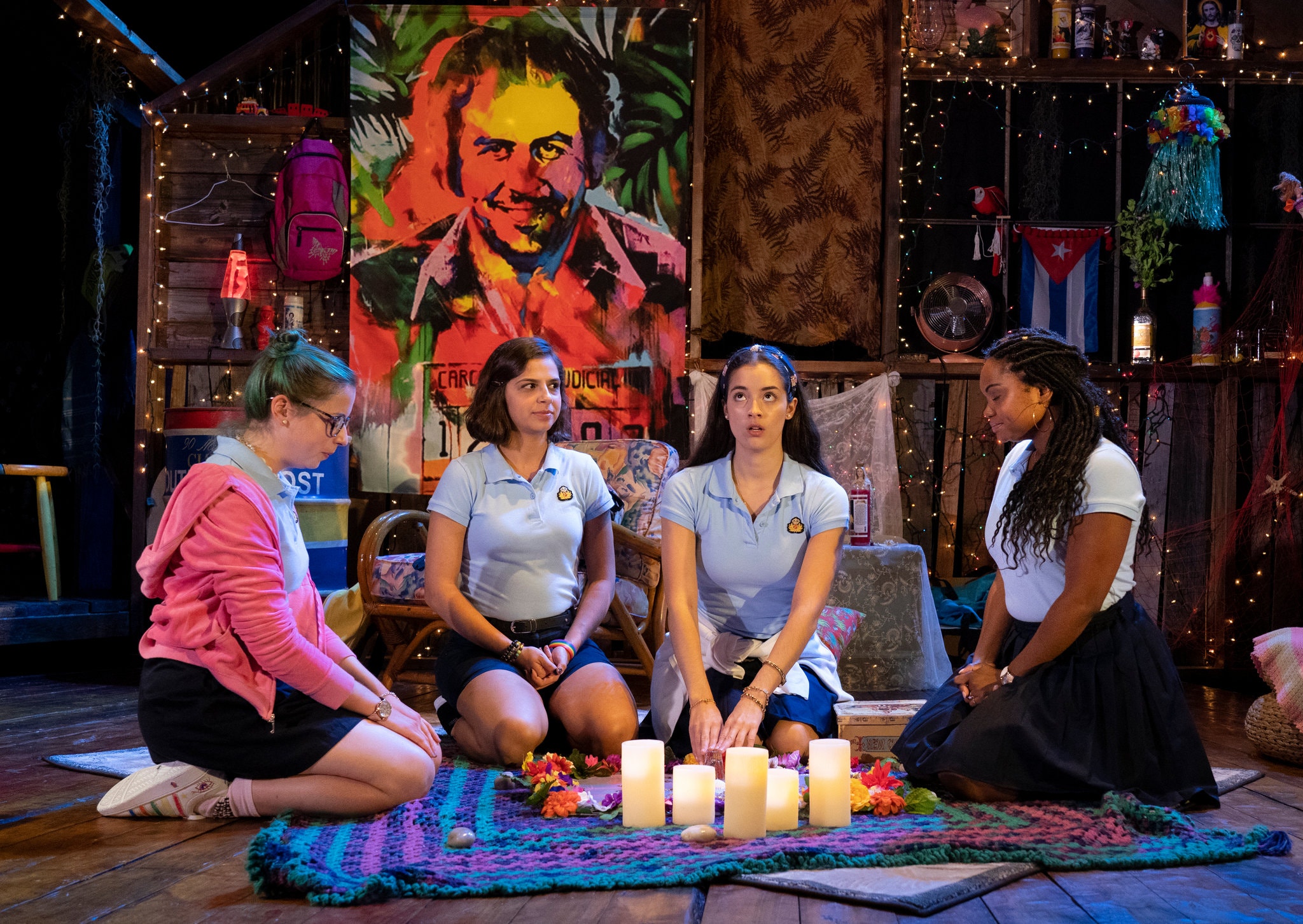The New York Times Critic’s Pick: Paging Pablo Escobar in ‘Our Dear Dead Drug Lord’

In a Miami treehouse the image of Pablo Escobar looms over (from left) Alyssa May Gold, Rebecca Jimenez, Carmen Berkeley and Malika Samuel in Alexis Scheer’s play.Credit…Sara Krulwich/The New York Times
By Ben Brantley
Sept. 26, 2019
Though we’ve just crossed the threshold into fall, you may already be thinking of Halloween, that time of year when we get to frighten ourselves with fantasies instead of being terrorized by the all-too-real world. It is also the moment when we can at least pretend to believe, for better or worse, that the dead do not stay dead.
If your thoughts have been wandering in that direction — as well they might when the days grow shorter and nights longer — you should know that they’re throwing quite a séance at the McGinn/Cazale Theater. That’s where you can wait for the arrival of the dangerously departed narco-terrorist Pablo Escobar, the title character of Alexis Scheer’s “Our Dear Dead Drug Lord,” in a cozy Miami treehouse.
The self-styled mediums in this highly entertaining, equally sobering little play — a co-production of the WP and Second Stage theaters — come naturally by their affinity for the dark side. They’re all teenagers — or, to be specific, teenage girls, a thin-skinned, hormonally saturated species that tends to exist at the tips of its nerve ends.
These young apprentices in sorcery are called — and I am using only the names they have been endowed with by their Ouija board — Pipe (Carmen Berkeley), Zoom (Alyssa May Gold), Kit (Rebecca Jimenez) and Squeeze (Malika Samuel). They hail from that distant year of 2008, when Barack Obama was just about to be elected the nation’s first black president, a time some of you may recall with a nostalgic sigh.
But it turns out there was plenty to be scared of then, too. That’s especially true if you grew up in the shadow of Sept. 11 and have now reached the age when death has stopped being just a spooky abstraction that happens to people you don’t know. And somehow, being in control of what surrounds you feels more elusive and more important than it ever has before.
Female adolescents and the supernatural have been a winning cultural formula in recent decades. You could imagine the girls of “Our Dear Dead Drug Lord” finding kindred souls among the likes of Buffy, Sabrina and the vampire-dating Bella Swan, though they might think it’s lame to admit it. (“Law and Order: SVU” is a more common reference, with Zoom endearingly declaring, “Olivia Benson is my spirit animal!”)
For the first half of its sprightly 90 minutes, staged by the fast-rising director Whitney White, “Drug Lord” feels as if it might belong to such shivery popcorn fare. Its four principal characters gather in the treehouse of Pipe, an upper-middle-class Cuban-American, as the entire membership of the Dead Leaders Club.
The group’s official status at the private school the girls attend is in limbo at the moment, since the administration frowns upon the choice of the notorious Escobar as an object of study. It could have been worse. As Pipe says, “Well, first it was Hitler, but somebody called us a hate group when we started wearing swastikas to school.” She’s joking, sort of.
The lines between jest and truth, assumed postures and bona fide feelings are hazy here. Ms. Scheer, a young playwright out of Boston, cannily exploits the porousness of that divide within adolescents, who still half-believe that thinking hard enough can transform fictions into facts. And she makes us aware of the perils of such a mind-set.
Thus, for the Dead Leaders Club, riffing on the notion of sacrificing an animal might indeed lead abruptly to just such an act. The idea that Kit — their newest member and the daughter of a Colombian single mother — might be the daughter of Escobar quickly gains traction. Equivocation about the friends’ sexual status and orientations are translated into physical realities.
We also gradually become aware that all these girls have a closer knowledge of death than we might have assumed at the beginning. And a play that started off as a hoot — a friendly, familiar satire on high school mores and lingo — winds up as a primal scream.
Each cast member defines her role with an intensity and individuality that are equally funny and scary. And you are always conscious, as you must be, of the combustible chemistry generated by this combination of distinctive, separate personalities longing to cohere into a whole.
ImageMs. Gold, left, as the hyperbolic Zoom and Ms. Jimenez as the quietly confident Kit. Ms. Gold, left, as the hyperbolic Zoom and Ms. Jimenez as the quietly confident Kit.Credit…Sara Krulwich/The New York Times
Ms. Berkeley, who brings to mind the young Winona Ryder, is a piquant study in poised prettiness about to crack open. Her Pipe has a wonderfully natural, uncomfortable erotic symbiosis with Ms. Jimenez’s first-rate Kit, an outsider who exudes quiet, defiant confidence.
Ms. Gold gets the funniest lines as the hyperbolic Zoom, and she knows what to do with them. And Ms. Samuel has just the right moves as a drama nerd who leads the group in a rehearsal for a school assembly dance performance. Like the play itself, this dance number starts off silly and exuberant, shades into a darker quirkiness and ends in a disquieting burst of isolating, atavistic energy.
The show — which features two additional cast members I am not at liberty to mention — has been steeped in a home-brewed sensuality that is both festive and creepy by a design team that includes Yu-Hsuan Chen (set), Andy Jean (costumes), Lucrecia Briceno (lighting) and Fan Zhang (sound). Yet the small-budget production hasn’t quite managed to pull off the grand guignol finale.
That’s partly because Ms. Scheer’s script becomes overcrowded with revelations as it heads toward its climax. And Ms. White’s direction, which has thus far managed to strike a delicate balance between the goofy and gruesome, feels rushed here.
Nonetheless, you’re likely to find yourself chanting the characters’ final words in your mind (or in my case, I’m embarrassed to say, out loud) as you walk down the street afterward. I won’t divulge what they are.
But, as befits a show about black magic, they are a fierce incantation, a shield and a vow that speak volumes about surviving the truly terrifying world that waits outside.
